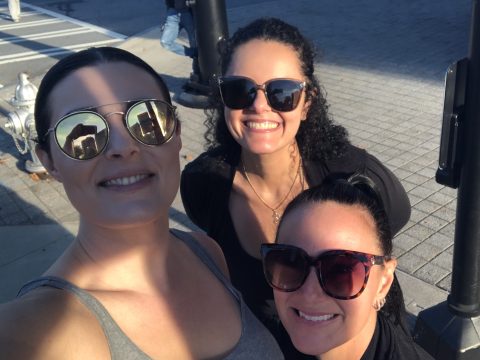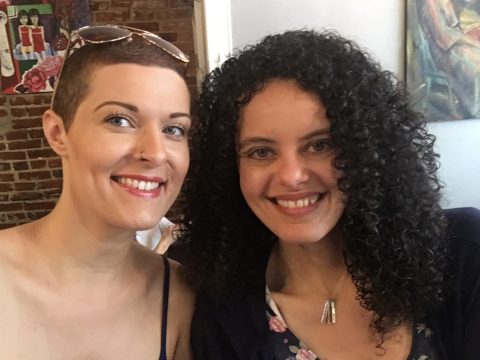Q+A: Film Travel Coordinator Ashley Saunders Talks Logistics and Longevity
By Carol Badaracco Padgett
“We are an incredibly easily accessed city,” says Ashley Saunders when you ask her about Atlanta’s advantages in snagging both reshoots and new film production in summer 2025.
Naturally, both infrastructure and studios are high on her list, too. And yet, the film industry is still finding its way following the strikes of 2023.
Funwoody sat down with Saunders to learn more about her role and where she sees the industry heading into autumn.
Describe your work and tell us which aspects you enjoy the most, and which are trickiest. Also, who do you interface with the most on each production?
Saunders: Essentially, it’s my job to take away people’s control and it creates a very sensitive situation where they’re not planning their own travel, and they don't have control over every little thing they're being asked to do.
Handling the heavy logistics is what’s fun for me. I enjoy the moving pieces--it's like playing human Tetris.
The hard part is navigating the political landscape of people’s needs—that’s a different landscape, and I have to be cautious of that.
Project to project, I interface the most with a blend of 2-4 people. It's usually the production coordinator, the production supervisor, the producer/unit production manager (UPM), whoever's filling that role, and then the 2nd AD.

How did you learn the heavy logistical skills a travel coordinator needs to be successful?
Saunders: I grew up military. My father was a fighter pilot (lieutenant colonel), and my mom was an air traffic controller. So the logistical part is kind of in my blood.
But the politics, you just learn. I think you have to be very emotionally aware to work in production, in the production office specifically. You have to be very emotionally intelligent to navigate a lot of these landscapes and understand people's dynamics.
Your role in film production keeps your finger on the pulse. Are domestic tax incentive programs like ours here in Georgia beginning to lure productions back from overseas?
Saunders: The tax incentive programs domestically are improving across the board. On the most recent rumor lists that I've read, I've seen an incredible uptick in productions happening in California, and that hasn't happened in a very, very long time. But that's still promising, even though it's California. It shows that there are still things happening domestically.
There are also productions in New Jersey and in New York. So it's starting to pick up. I think I'll be more encouraged when I see it hitting New Mexico and Texas and Louisiana and Georgia, of course, where there will be more volume in those states [where] incentives will be utilized.
What are your hopes for the film industry at large as it moves forward?
Saunders: If the industry [overall] would just be more open to keeping as many jobs here domestically as possible--to honor the American film crew that caters to the industry as a whole. Since we work together, it's not like it’s the film industry versus everyone else, or the studios versus everyone else. It’s all of us. We all play a role in it. It’s important to make sure studios understand that it’s important to keep work here.
In the creative industry, we don’t expect every project to be handled domestically, and we know that [studio heads] have to account for business decisions. This is still a capitalistic industry. But [during the strikes] a lot of lives were damaged. And I think it’s time to fix that, move forward, and rebuild.

What words of advice do you have for people interested in below-the-line careers, such as yours, in the film industry today?
Saunders: This industry requires a very thick skin. And it requires you to
navigate a landscape that has a set of rules, but they're not always abided by.
This is not like the typical job where you get in and then you just work your way up. While that is a possibility, you will likely try a bunch of different positions and a bunch of different departments before you figure out where you really want to land.
So, I think being really open-minded is important. Having a thick skin is important. Being a hard worker is too, and being able to be autonomous in that you take ownership and possession of your job, while at the same time being a part of the team.
It’s also important to realize that despite the glitz and the glamour of Hollywood, this is not an entitled field. You have to work really, really hard.
Let’s close with your favorite projects you've worked on …
Saunders: My ultimate favorite was Taken 3 (2014 action/thriller starring Liam Neeson) that I did many years ago. That was such a good crew.
I'm also finishing up one now for Sony called The Breadwinner, and this has been fantastic. This year we [also] finished Saturday Night, about the debut of SNL in 1975, that just came out.
I did The Breadwinner and Saturday Night with [veteran] producer JoAnn Perritano [Avengers: Endgame and The Quiet Place II are among her credits], and working with her is a dream.